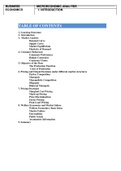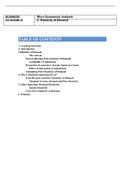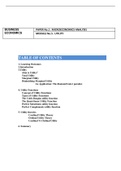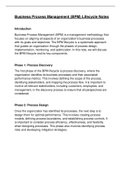Sadhakraj
On this page, you find all documents, package deals, and flashcards offered by seller sadhakraj.
- 6
- 0
- 1
Community
- Followers
- Following
6 items

Micro Economic analysis (introduction)
Microeconomic analysis is the study of economic behavior at the individual or small group level. Utility refers to the satisfaction or pleasure that a consumer derives from consuming a good or service. In microeconomic analysis, utility is used to explain how consumers make choices among goods and services in order to maximize their satisfaction, subject to budget constraints. Utility can be measured in different ways, but the most common method is through the use of utility functions, which ass...
- Package deal
- Class notes
- • 16 pages •
Microeconomic analysis is the study of economic behavior at the individual or small group level. Utility refers to the satisfaction or pleasure that a consumer derives from consuming a good or service. In microeconomic analysis, utility is used to explain how consumers make choices among goods and services in order to maximize their satisfaction, subject to budget constraints. Utility can be measured in different ways, but the most common method is through the use of utility functions, which ass...

Micro Economic analysis (Law of demand)
Microeconomic analysis is the study of economic behavior at the individual or small group level. Utility refers to the satisfaction or pleasure that a consumer derives from consuming a good or service. In microeconomic analysis, utility is used to explain how consumers make choices among goods and services in order to maximize their satisfaction, subject to budget constraints. Utility can be measured in different ways, but the most common method is through the use of utility functions, which ass...
- Package deal
- Class notes
- • 13 pages •
Microeconomic analysis is the study of economic behavior at the individual or small group level. Utility refers to the satisfaction or pleasure that a consumer derives from consuming a good or service. In microeconomic analysis, utility is used to explain how consumers make choices among goods and services in order to maximize their satisfaction, subject to budget constraints. Utility can be measured in different ways, but the most common method is through the use of utility functions, which ass...

Micro Eco analysis (Elasticity of Demand)
Microeconomic analysis is the study of economic behavior at the individual or small group level. Utility refers to the satisfaction or pleasure that a consumer derives from consuming a good or service. In microeconomic analysis, utility is used to explain how consumers make choices among goods and services in order to maximize their satisfaction, subject to budget constraints. Utility can be measured in different ways, but the most common method is through the use of utility functions, which ass...
- Package deal
- Class notes
- • 12 pages •
Microeconomic analysis is the study of economic behavior at the individual or small group level. Utility refers to the satisfaction or pleasure that a consumer derives from consuming a good or service. In microeconomic analysis, utility is used to explain how consumers make choices among goods and services in order to maximize their satisfaction, subject to budget constraints. Utility can be measured in different ways, but the most common method is through the use of utility functions, which ass...

Micro Eco analysis(Demand Estimation and Forecasting)
Microeconomic analysis is the study of economic behavior at the individual or small group level. Utility refers to the satisfaction or pleasure that a consumer derives from consuming a good or service. In microeconomic analysis, utility is used to explain how consumers make choices among goods and services in order to maximize their satisfaction, subject to budget constraints. Utility can be measured in different ways, but the most common method is through the use of utility functions, which ass...
- Package deal
- Class notes
- • 15 pages •
Microeconomic analysis is the study of economic behavior at the individual or small group level. Utility refers to the satisfaction or pleasure that a consumer derives from consuming a good or service. In microeconomic analysis, utility is used to explain how consumers make choices among goods and services in order to maximize their satisfaction, subject to budget constraints. Utility can be measured in different ways, but the most common method is through the use of utility functions, which ass...

Business Economics (utility)
Microeconomic analysis is the study of economic behavior at the individual or small group level. Utility refers to the satisfaction or pleasure that a consumer derives from consuming a good or service. In microeconomic analysis, utility is used to explain how consumers make choices among goods and services in order to maximize their satisfaction, subject to budget constraints. Utility can be measured in different ways, but the most common method is through the use of utility functions, which ass...
- Package deal
- Class notes
- • 13 pages •
Microeconomic analysis is the study of economic behavior at the individual or small group level. Utility refers to the satisfaction or pleasure that a consumer derives from consuming a good or service. In microeconomic analysis, utility is used to explain how consumers make choices among goods and services in order to maximize their satisfaction, subject to budget constraints. Utility can be measured in different ways, but the most common method is through the use of utility functions, which ass...

Business Process Management Lifecycle
The notes on Business Process Management (BPM) provide an overview of the BPM lifecycle and its importance in modern companies. The notes explain the benefits of BPM, including process optimization, improved visibility, better decision-making, increased agility, enhanced customer experience, reduced costs, and improved compliance. The notes also highlight the key components of the BPM lifecycle, including process design, modeling, implementation, monitoring, and optimization. Additionally, the n...
- Class notes
- • 7 pages •
The notes on Business Process Management (BPM) provide an overview of the BPM lifecycle and its importance in modern companies. The notes explain the benefits of BPM, including process optimization, improved visibility, better decision-making, increased agility, enhanced customer experience, reduced costs, and improved compliance. The notes also highlight the key components of the BPM lifecycle, including process design, modeling, implementation, monitoring, and optimization. Additionally, the n...
